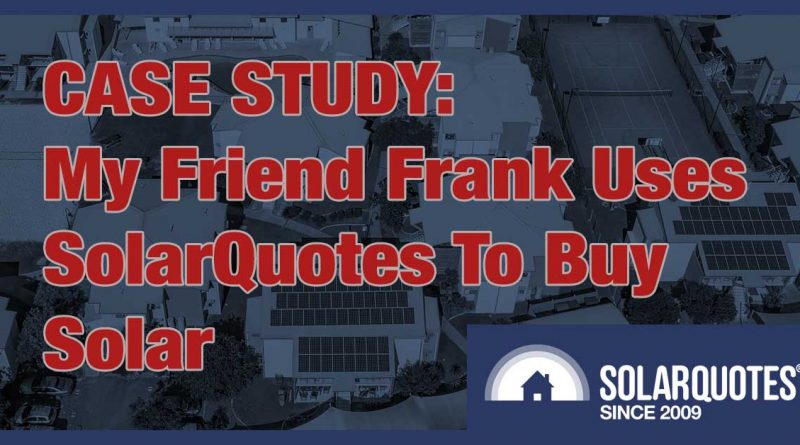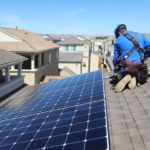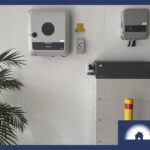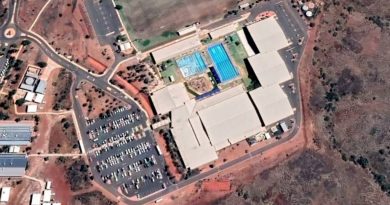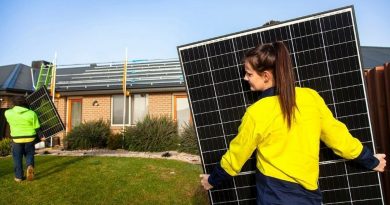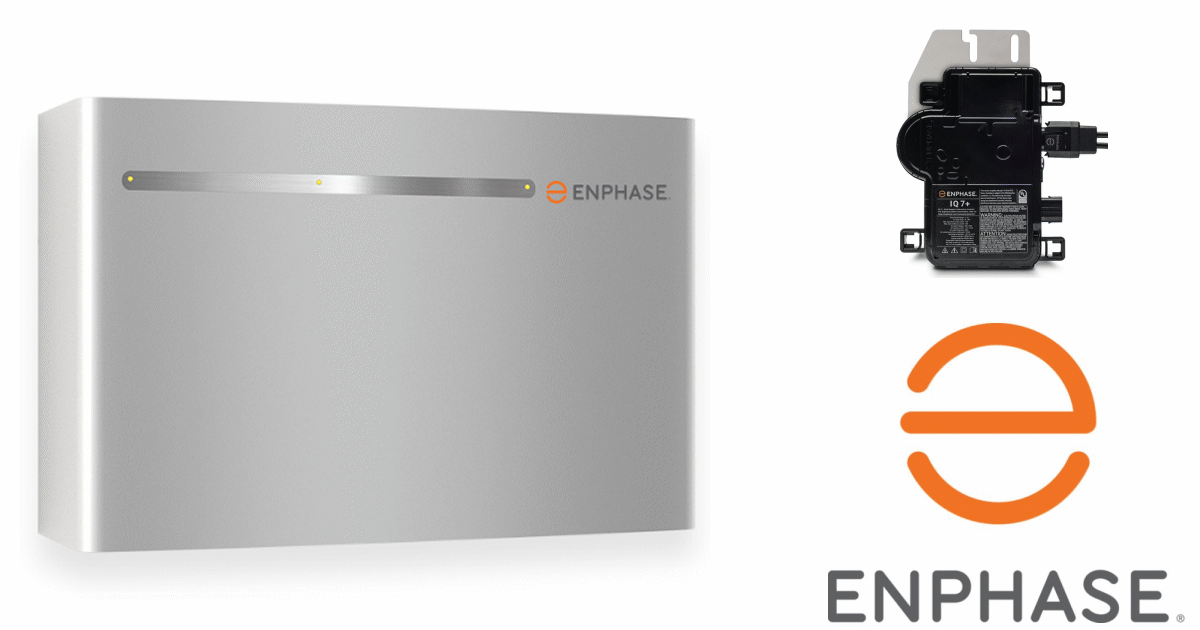How My Friend Frank Used SolarQuotes To Buy Solar
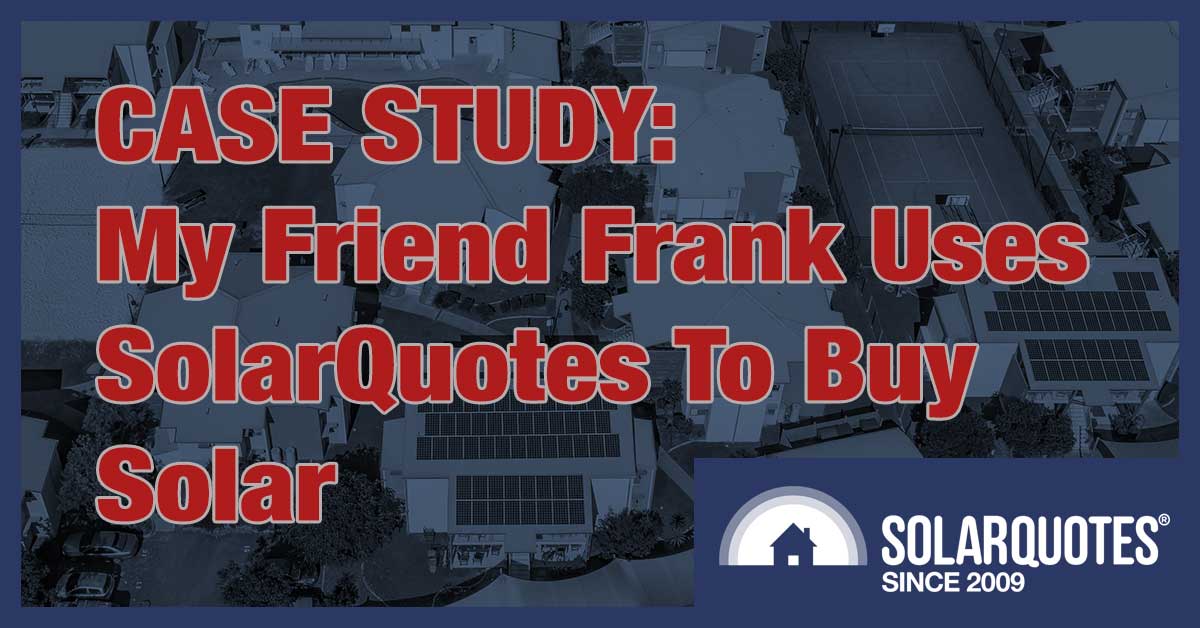

My friend Frank was considering putting solar panels on his roof, so — knowing I’m a solar guru — he asked me what he should do. I told him to use the SolarQuotes site and — if it was okay with him — I’d write about his experience. He said that was fine provided I didn’t make any horrible puns and we shook hands on it. This was a little painful because I had my fingers crossed at the time.
In this article, I will take you through the whole process he went through to get a reliable, low-cost, and well-installed solar system here in Adelaide. I will cover…
- His initial thoughts — and misconceptions — about rooftop solar.
- Using the SolarQuotes website and answering the questions it asked him.
- Deciding on which quote to go with.
- The installation, and finally…
- The meter changeover.
I’ll also let you know whether or not he appreciated the advice I gave him and if we’re still friends.
My Friend Frank
My friend Frank is a bright young man with a bright future ahead of him. On most days he also has a brightly illuminated roof. Because he’s so bright, he wanted to see if he could take advantage of all that illumination by putting a solar power system on his roof.
He’s very focused on making sound investments for his future and wanted a reliable solar system. But he was also on a budget because he’s saving for his honeymoon. As he put it, the more expensive his solar power system, the shorter his honeymoon will be.
I asked where he was planning to go and he said, if they were able to travel, he’d like to go to Hawaii or maybe somewhere else in the United States. I suggested Frankie go to Hollywood, and he just gave me an exasperated look and said, “Relax, don’t do it, when you want to pun.”
[embedded content]
Solar Power Misconceptions
Before he used the SolarQuotes website Frank and I chatted about solar power and I discovered he had a few misconceptions. These were:
- His household electricity consumption was low, so he wasn’t sure solar panels would be worthwhile.
- Because of his low electricity consumption, he thought a battery might make sense because it would increase the amount of solar energy generation he would use.
- He thought there was no point in getting a solar system larger than 6.6 kilowatts.
Luckily, he had me to set him straight. Or rather, at that time, I thought I had set him straight…
Solar Worthwhile For Low Electricity Use Homes
Frank wasn’t certain solar panels would pay for him because there are only two people in his house, and neither use much electricity. This is partly because they’re careful with consumption, but also because they have a gas hot water system and stove.
I told him to try out the SolarQuotes Solar & Battery Calculator. This will estimate the simple payback time for solar, which is how long it takes for the savings on electricity bills to equal the cost of a solar system.
If you enter an Adelaide postcode into the calculator and use the default figures that come up, it will give a simple payback period of 3 years and four months for a 6.6 kilowatt system. That’s damn good. Because a quality solar system lasts a long time, I can’t think of any better investment. At least, not anything legal1.
Frank’s electricity consumption is lower than the default, but this isn’t a problem because the calculator allows you to enter your annual electricity bill. You can also adjust the per kilowatt-hour cost of grid electricity and the solar feed-in tariff, as well as enter the cost of the solar power system.
After entering figures he was happy with, the calculator told Frank the simple payback time of a 6.6 kilowatt solar system on his roof would be 2 years and 10 months. He was pretty chuffed about that. I then warned him grid electricity prices and solar feed-in tariffs could fall in the future. It’s definitely possible that, before long, all homes in South Australia with smart meters will have no choice but to use a time-of-use tariff and this can reduce the return from solar.
While our Solar & Battery Calculator can’t compute time-of-use tariffs at the moment, I told Frank he could simulate the effect by reducing the cost of grid electricity. This is because a time-of-use tariff will charge less for electricity during the day when solar systems provide power.
After hearing this, Frank decided to crank the cost of grid electricity down to 20 cents and the feed-in tariff to 10 cents, which I consider very pessimistic. Despite this, the simple payback period only increased to 4 years and Frank was very happy with that pessimistic payback time.
A Solar Battery Won’t Pay
Because he doesn’t use much electricity, Frank thought a home battery might save him money. By storing solar energy he didn’t use during the day for use at night, he thought he might be able to increase his solar self-consumption2 to a level where, along with the SA Home Battery Subsidy, it would make a battery pay.
I had to break it to him that’s not how it works with today’s battery prices. A household needs a high evening electricity consumption for a battery to even come close to paying for itself, even with the state subsidy. Some people buy batteries because of their ability to provide backup power, but Frank doesn’t put a high value on that and decided not to get one. I told him he could always get a battery installed later when prices come down.
More Solar Panels Equals More Savings
Frank had heard 6.6 kilowatts was a good size for a solar system and had decided that would be all he’d need. I told him that was a good size several years ago, but he’d be better off going bigger and suggested he get as much solar as would reasonably fit on his roof while remaining within his budget. I set up a whiteboard and took out some markers and outlined four reasons why it was a good idea:
- Going bigger usually — but not always — lowers the cost per kilowatt of solar.
- Because he has single-phase power in South Australia, his inverter will be export limited if he gets a system over 6.66 kilowatts. But the losses from this are likely to range from insignificant to none.
- He’ll be prepared for the future if he buys a battery or electric car or his consumption increases.
- While a larger solar system can have a longer payback time than a smaller one, it can still be a better investment. If you’re getting solar panels to save money, you should aim to get a system that is the best investment for you overall and not one with the shortest payback time.
After I had finished telling Frank all this, he nodded to indicate he understood and agreed with me. I did notice his eyes had glazed over soon after I’d started lecturing him a couple of hours earlier, but I assumed he got the thrust of my message. Otherwise, why would he nod and smile?
Frank Uses SolarQuotes
After giving Frank the benefit of my years of experience and minutes of wisdom, it was time for him to use the SolarQuotes website and get some quotes. I was there with him as he went through the process, which mainly consists of entering your postcode and answering some questions.
We try to keep the number of questions to a minimum since we don’t want to take up your time, but our goal is to get enough information to allow the installers to do a good job of helping you, so be prepared to spend a few minutes on it.
If you don’t know the first thing about solar power, apart from the fact you’re interested in getting some, that’s not a problem. Just answer the questions as best you can. But if you want more information you can check out our Solar 101 Guide that takes you through the basics.
There’s also a massive amount of information on our website including videos, info dumps on specific topics, and blog posts. I’ve even written some of it myself. You can also read Finn’s best-selling book, The Good Solar Guide, for free.
I’ll go over the questions Frank answered below but, because we’re always looking to improve things, it’s possible that when you use the website we’ll have tweaked them so they’ll be a little different from what they are now.
Frank Answers SolarQuotes Questions
I told Frank to go to the SolarQuotes home page and enter his postcode in the box at the top right. Here’s what it looks like:
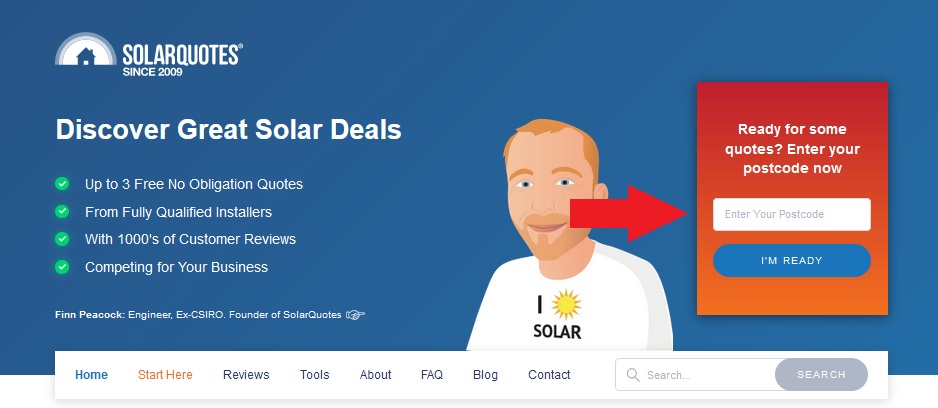
Normally there isn’t a giant red arrow sticking out of the side of Finn’s face. I just put it there to make it clear where to enter your postcode.
After he entered his postcode, this came up:
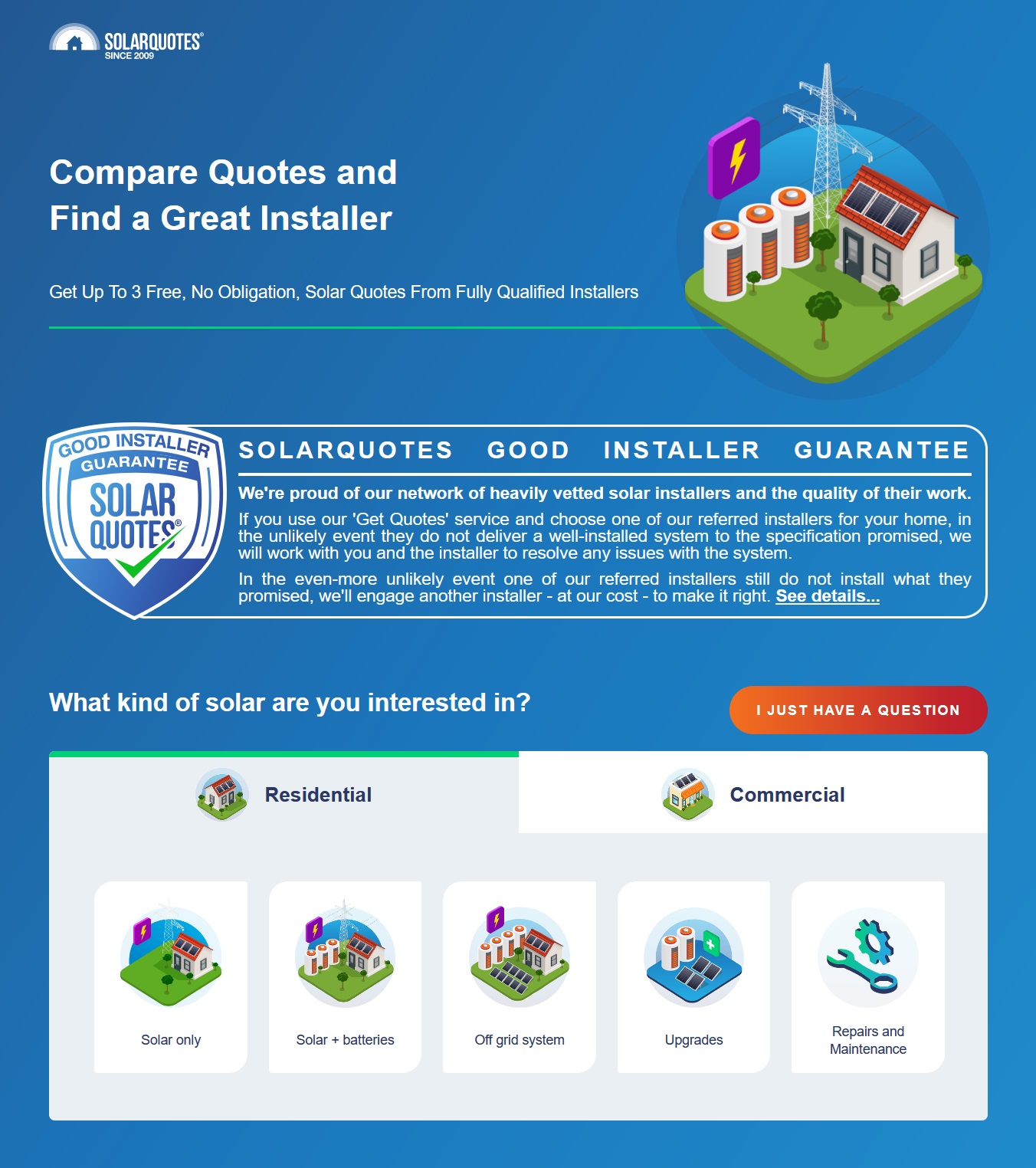

You can see the SolarQuotes Good Installer Guarantee there, which Finn is very proud of:


I don’t feel much in the way of emotions on account of how I’ve seen some things, man, but I have to admit I’m a bit proud of it too.
But what Frank needed to focus on to get his quotes was lower down the page:
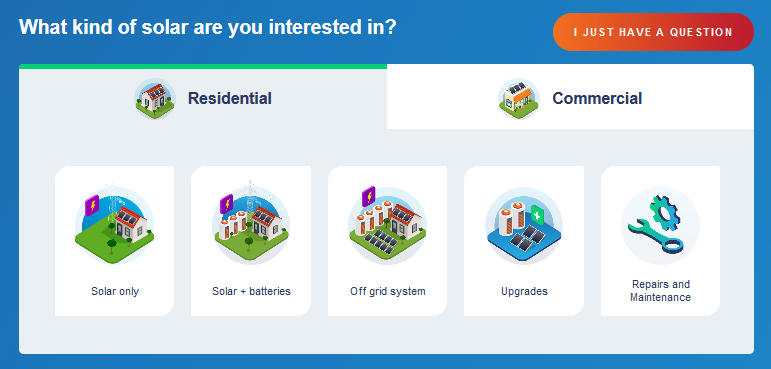

This part of the screen defaults to residential installations, but if you want commercial you can click on that.
Five options are presented:
- Solar only
- Solar + batteries
- Off-grid system
- Upgrades
- Repairs and Maintenance
Frank only wanted solar only, so he clicked on that and this question came up:
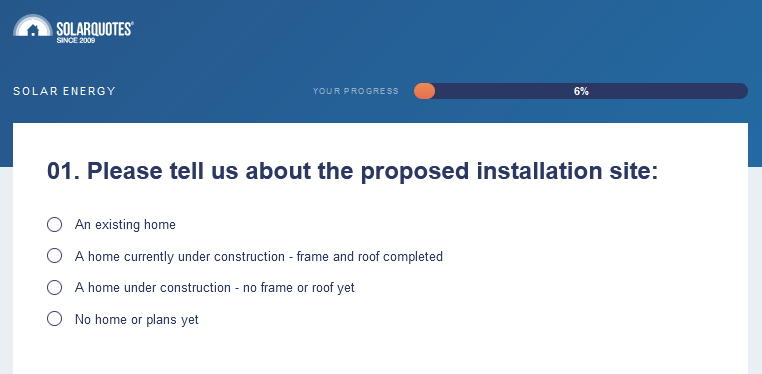

This is an easy question and Frank clicked the circle for, “An existing home”.
The next question was:
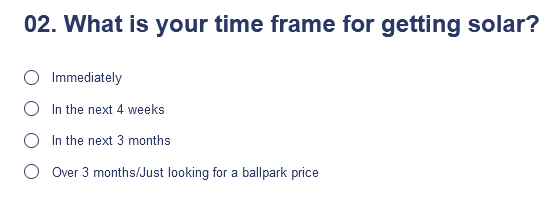

Frank clicked on, “In the next 4 weeks”. I asked him why he chose that when nothing was stopping him from getting solar panels right away. He said he didn’t want to seem too eager to get solar installed because he might not get a good price.
While that can be a useful tactic in many sales situations, you can trust me when I tell you no installer in our network will charge you more because you said you want a solar power system immediately. If they’re not busy they’ll just be glad you want it without delay and can get things moving right away. But note it is normal to have to wait several weeks before a system is installed. Bad weather can also cause delays.


As he has no solar, Frank obviously wanted a complete system and clicked on that.
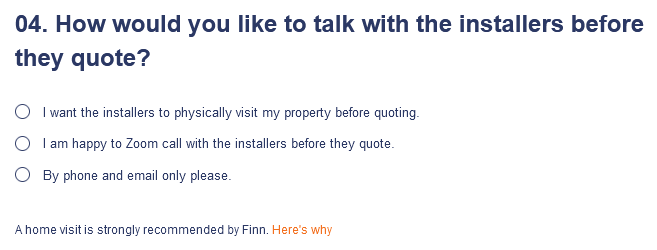

As you can see from the note at the bottom, Finn recommends a home visit and you can read his explanation here. But Frank didn’t bother to click the link. He chose the second option, “I am happy to Zoom call with the installers before they quote” because he thought it was a better choice for people living in a time of COVID.


Frank decided to get quotes from three installers. Because we’ve gone through the hard job of weeding out dodgy installers and will only refer you to ones that do good work, that’s a reasonable number to consider. But if you only want one or two quotes, that’s still a safe thing to do, as we only refer quality solar installers.
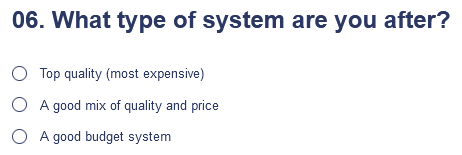

For this one, Frank clicked on the middle option, “A good mix of quality and price”.
I asked him why he did that when I knew he was budget focused and he told me he wanted to make sure he got a reliable solar system.
It’s definitely true that when you’re not using SolarQuotes, choosing the cheapest system available is an excellent way to get one that isn’t reliable. But when you are using SolarQuotes and ask for a good budget system, then a good budget system is what you will get. It’s not a euphemism for low price and low quality, as it is in many situations.
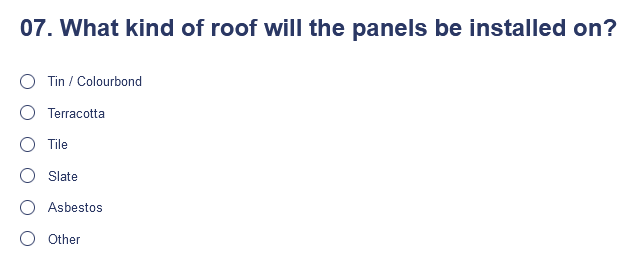

This was an easy question and Frank simply clicked, “Tile”.
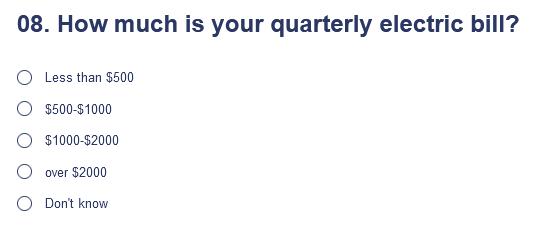

Frank clicked, “Less than $500”. Because electricity is expensive in Adelaide, that indicates his electricity consumption isn’t high.


Frank clicked on “1”. This question is so installers can allow for the cost of appropriate equipment and safety gear in their quotes.
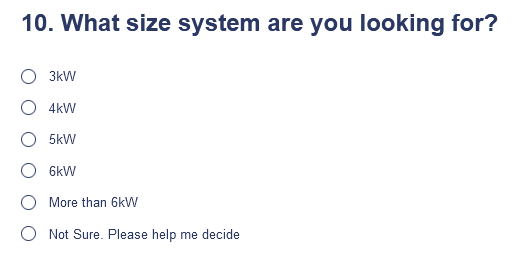

Under my watchful gaze, Frank clicked on, “More than 6kW”.


Frank is the kind of person who likes to pay cash and chose the first option.
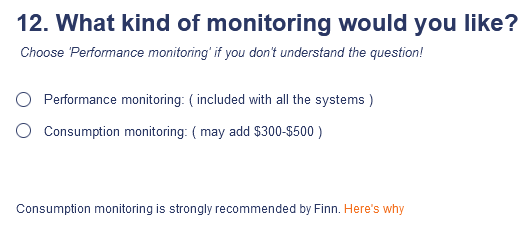

Provided you can afford it, consumption monitoring is a good idea — if you’re the sort of person who will actually use it. You can read why it’s a good idea here. But because Frank was looking to save money he decided to do without it and clicked, “Performance monitoring: ( included with all the systems )”.


Microinverters and power optimisers can potentially help with shade issues and have some other advantages, but they add to the cost of a system. Because Frank’s roof has no shade issues he chose, “No”.
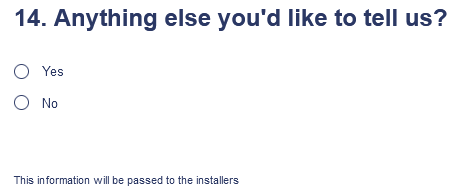

Frank didn’t have anything he wanted the installers to know, so he clicked, “No”.
And that was it. Frank had answered all the questions and it had only taken him a few minutes. All he had to do to complete the process was enter his address, which he did on this screen here:
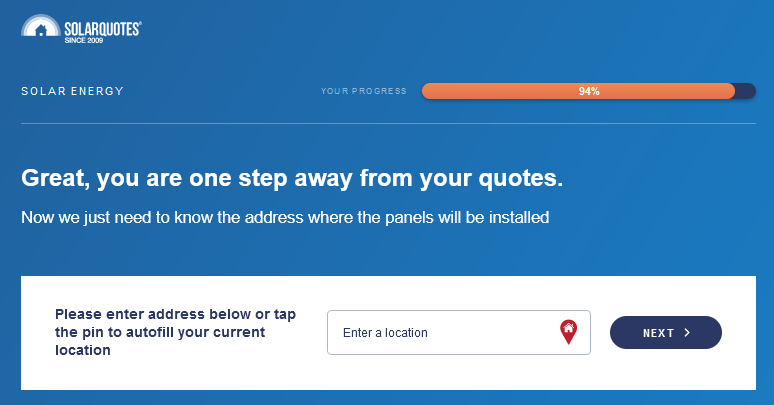

Your Information Won’t Go To Anyone Else
The information you enter into the SolarQuotes website is only seen by us and installers we refer to you. We will never sell it to anyone else. We won’t give your personal information away either. Because that would be wrong.
I’ve had people offer to sell me personal information. Last time it happened was for a list of people attending a conference. I feel like I should report these people to the police, but because I’m not clear on the legal details I just tell them to go to hell.
Frank Gets 3 Quotes
Over the next few days, Frank was contacted by the three installers and then received his quotes. I didn’t bother helping him choose an installer. The decision was his to make. I also wasn’t worried because I knew he would get a well-installed system no matter who he went with.
After a couple of weeks, Frank told me he was going with Adelaide Solar Systems:

Neither of these people is Frank, but if it makes you feel better you can pretend one of them is.
I asked Frank for details and he said he was getting a six kilowatt system. My response was…
I was so flabbergasted my flabber was at maximum gast. “Didn’t you pay attention when I when I said you should go bigger than that?” I cried in despair.
“Not really,” said Frank. “I saw your lips were moving, but I just assumed you were droning on like you normally do, so I tuned you out and read War and Peace on my phone.”
He told me our Solar & Battery Calculator gave a shorter payback time with a six kilowatt system than a larger one, so he thought he’d be better off with that. I told him to enter whatever figures he thought were reasonable into the calculator and increase the size of the system over 6.6 kilowatts and see if the return on his investment was still better than anything else he could do with his money.
He did that and said…
“Ohhhh… I get it now. I’ll ask Adelaide Solar Systems to give me a quote for a larger size.”

“Make my monster grow!”
Frank’s 8.51 Kilowatt Solar System
Adelaide Solar Systems were happy to give Frank a quote on a larger system and they suggested this:
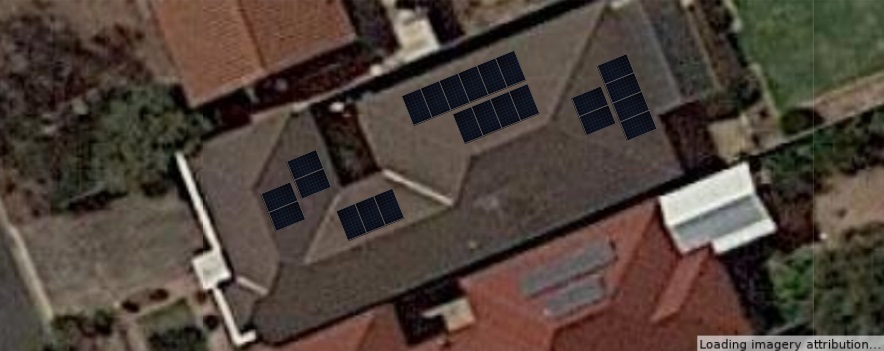

This is an 8.51 kilowatt solar power system with 23 panels. It’s on four different sections of a tile roof. This means it’s not the easiest of installations. The easiest installation is usually putting panels on one large section of a metal roof. Note this isn’t a photograph of the installed system, it’s just a mock-up from the quote.
Solar Panels: Here are the panels that were used:
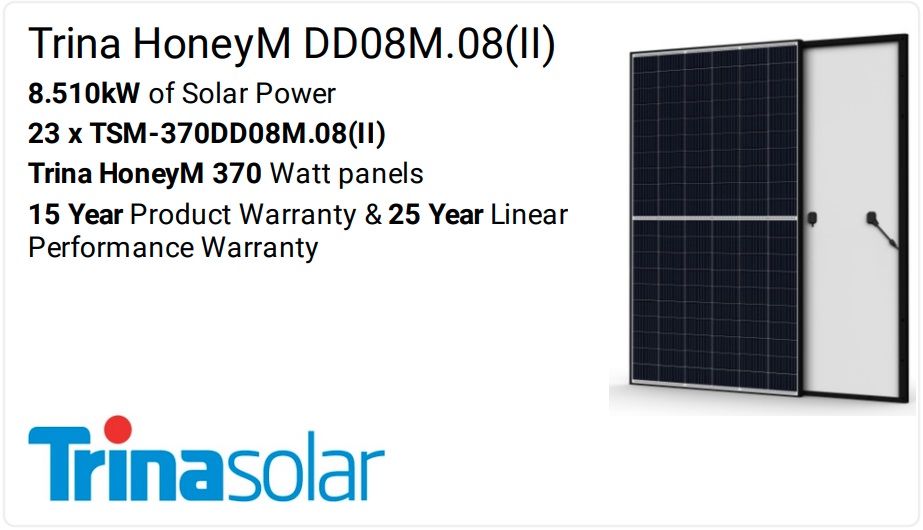

Trina Solar produce lower cost, reliable panels. A long time ago3 Trina had a problem with defective panels, but they replaced them. This responsible behaviour is part of the reason we’re able to recommend them.
These particular panels have a 15 year product warranty and a 25 year performance warranty. According to my interpretation of Australian Consumer Law, Trina will have to repair, replace, or provide a refund for defective panels for the full 25 years of their performance warranty. Despite this, it’s still a good thing they have a fairly long product warranty. But note that I’m not actually a lawyer. This means that, while I could give my opinion in court, I can’t actually come up with some astounding legal bullshit to save the day.
Inverter: Here is the inverter:
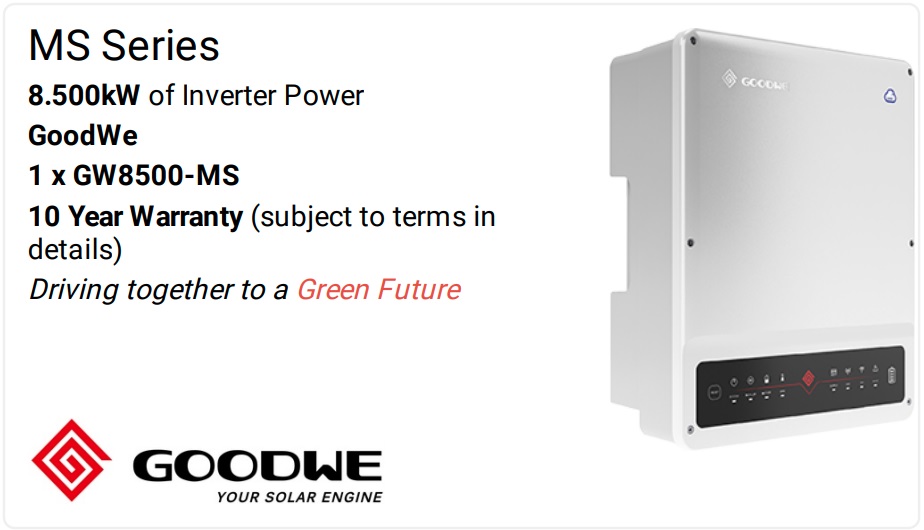

Goodwe inverters are not expensive, but still reliable. They now have a 10 year warranty and are hardware we can recommend. This particular series of inverter has 3 MPPTs or Maximum Power Point Trackers. I won’t go into the technical details, but that’s one more than most inverters have and it can make installations easier. It has an efficiency of 97.3%, which is very good.
Warranties: With a 10 year warranty for his inverter and 15 and 25 year warranties on his panels — and because it was installed by someone we know does good work — Frank should not be out of pocket for any repairs to his solar system for a minimum of 10 years. But he can be pretty confident his inverter will last longer than that. The only cost Frank should have to pay for a long time is to have it inspected every five years.
System Cost: This solar power system was $5,800. That’s a very competitive price.
This does not mean that you can get an 8.51 kilowatt system from Adelaide Solar Systems for that much. It will depend on your roof, the difficulty of the installation, and solar hardware prices and exchange rates. But it does mean you can get a very competitively priced, and well-installed solar system from them. The same can be had from a considerable number of other quality installers in Adelaide.
Lower Cost Per Kilowatt For Larger Systems
The system Frank was originally going to get was 5.92 kilowatts and would have cost him $4,300. That’s $726 per kilowatt.
The system he settled on was 8.51 kilowatts and cost $5,800. That’s $681 per kilowatt.
So each additional kilowatt above 5.92 kilowatts only cost him $579. That’s 20% less than the average cost per kilowatt of the smaller system.
This is a major reason it can pay to go big with rooftop solar.
Spare Tiles
Before the installation, Adelaide Solar Systems asked Frank if he had any spare tiles, but didn’t ask for a specific number. Frank had plenty, so it wasn’t a problem. It’s not uncommon for some tiles to be broken when you are walking all over the roof and grinding grooves in tiles for the mounting brackets. If you don’t have any spare tiles it’s best to grab some that match your roof beforehand. If you can’t find any that look exactly the same as the ones already there you can ask the installers to put any replacements under the solar panels where they won’t be seen.
The Installation
Frank was working at home the day he’d arranged for the installation and said the entire 8.51 kilowatt installation only took about 4 hours. That is very efficient. He said there was some noise, but he put on his headphones and it didn’t really worry him. After the work was done they cleaned up and showed him the system was working.
It turned out they didn’t need spare tiles because they didn’t break a single one.
And that was it. He had solar power.
Well, it was almost it. He still had to get his electricity meter changed over.
Electricity Meter Change
Most homes in Australia — except in Victoria — will need their meter changed when solar is installed. Electricity retailers are now in charge of electricity meters and I warned Frank not to change his retailer before his meter was changed because it could easily delay the process.
Frank is with Origin Energy and they took 3 weeks to change the meter. Now Frank is free to enjoy his cheap solar electricity and send the surplus generation into the grid where it will…
- Help lower electricity prices for everyone, and…
- Reduce fossil fuel generation, which is good for our health and slowing climate change.
Happy Frank
Now his solar system is up and running Frank is, to be frank, a happy man. He told me over the past week he has only used 10 kilowatt-hours of grid electricity. That’s under 1.5 kilowatt-hours a day and under a quarter of his usual grid consumption.
After he told me what he thought of his solar power system, I said I would quote him in full:
“It’s beautiful.”
I agree with Frank. He got a good system, he got a good deal, and he went through us so he’s protected by the SolarQuotes Good Installer Guarantee. He got a solar system that’s great for him and has the peace of mind that comes from knowing it will operate as promised.
On top of all that, he’s still my friend, so I also win.
Mind you, if I was living in Frank’s house, I would have used the south-facing roof to install an even larger system4. But I’m a solar nut. Frank’s system suits him well. It will rapidly pay for itself while still being large enough to charge a home battery or electric car in the future. He’s also ready if he wants to make the financially sound choice of giving up his gas connection and going all-electric. But whether or not he decides to give up on gas now, he’s saving money on his electricity bills and saving for an even brighter future.
Footnotes
- Actually, I can’t think of anything illegal that gives that good a return either. Now I’m worried the only reason I’m not a successful criminal is a lack of imagination. ↩
- Solar self-consumption is the percentage of solar energy a home consumes itself. ↩
- A long time ago as measured in solar years. Technically, a solar year is exactly one year — that is, the time it takes the earth to go around the sun. But the solar industry has developed so rapidly 5 years in the past seems ages ago and 10 years is ancient history. ↩
- I’d probably spend a couple thousand or more to upgrade to three-phase power. This would let me install a huge solar system and be prepared to send huge amounts of power into the grid from a battery — whether it’s stationary household storage or in an electric car. ↩
Original Source: https://www.solarquotes.com.au/blog/solar-buying-process/

